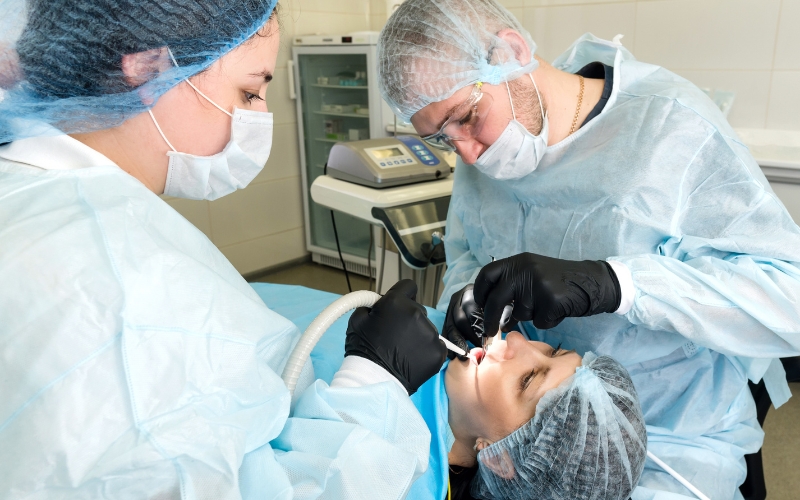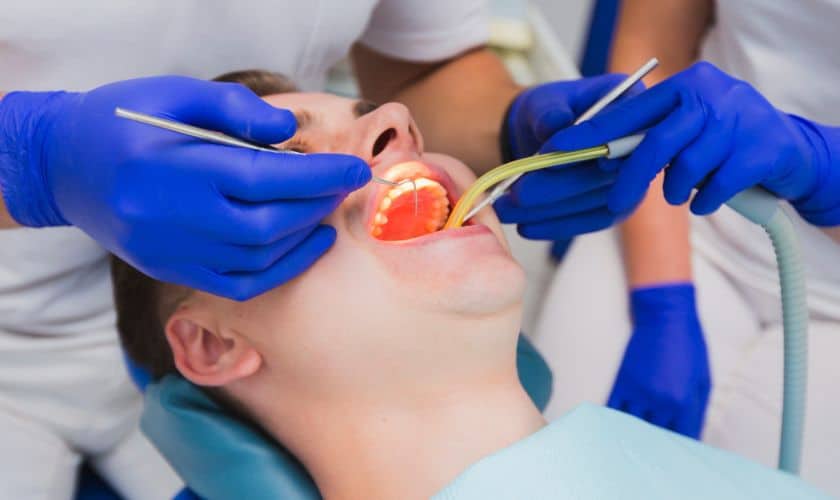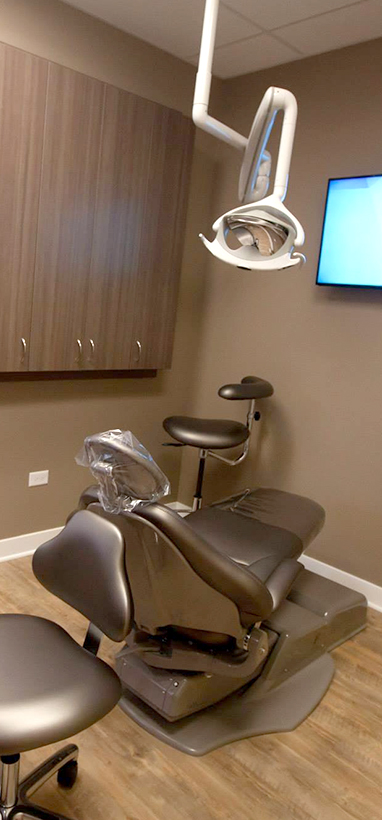1516 Legacy Cir, Naperville, IL 60563
5 Dental Conditions When Oral Surgery is the Only Solution

- Maintaining good oral health is crucial for overall well-being, but dental conditions sometimes require more than routine care. In such cases, surgical dentistry helps address complex dental issues.
- Oral surgery involves surgical procedures performed by skilled dental professionals to treat various conditions affecting the teeth, gums, and jaw. Here, we will explore five common dental conditions often requiring surgery as the optimal treatment approach.
- From impacted wisdom teeth to corrective jaw surgery, this blog will delve into each condition, highlighting its causes, symptoms, and the importance of maxillofacial surgery. Additionally, we’ll provide tips for achieving success with dental surgery, ensuring a smooth and comfortable recovery process.
Understanding Oral Surgery
Oral surgery is a specialized dentistry branch involving surgical procedures to treat various dental conditions. It is vital in addressing complex issues such as impacted wisdom teeth, severely damaged teeth, temporomandibular joint disorders, corrective jaw surgery, and dental implants. These procedures require the expertise of skilled oral surgeons to ensure successful outcomes.
Condition 1: Impacted Wisdom Teeth
Firmly pressed wisdom teeth are a common dental condition requiring Oral surgery. Wisdom teeth, or third molars, typically emerge during the late teenage years or early adulthood. However, these teeth may become impacted due to lack of space or misalignment, meaning they fail to erupt through the gum line fully. Ignoring it can lead to various complications, such as pain, infection, crowding, and damage to adjacent teeth.
Condition 2: Severely Damaged or Decayed Teeth
When teeth are severely damaged or decayed beyond repair, maxillofacial surgery may be the only viable option. In such cases, extracting the affected tooth is necessary to prevent further oral health complications. Besides, it can cause intense pain, infection and compromise the surrounding teeth and gums.
Here, undergoing surgery involves removing the damaged tooth from its socket. After the extraction, the dentist may recommend options for tooth replacement, such as dental implants or bridges, to restore both function and aesthetics.
Condition 3: Temporomandibular Joint (TMJ) Disorders
Temporomandibular Joint Disorders (TMJ disorders) affect the joint that connects the jawbone to the skull. Common symptoms include jaw pain, difficulty opening or closing the mouth, clicking or popping sounds, and headaches. In cases where conservative treatments like medications, physical therapy, or splints fail to provide relief, oral surgery may be necessary.
TMJ treatment aims to address the underlying cause, which can vary from joint misalignment to structural issues. Arthroscopy, arthrocentesis, or open-joint surgery are potential surgical approaches, depending on the severity and complexity of the disorder. These procedures help alleviate pain, restore proper jaw function, and improve quality of life.
Condition 4: Corrective Jaw Surgery
Corrective jaw, or orthognathic surgery, is often required for individuals with severe jaw misalignment or skeletal discrepancies. Such conditions can impact proper biting, chewing, speech, and facial aesthetics. The surgery involves repositioning the jaws to achieve a harmonious bite and facial balance.
Here, the oral surgeon makes precise incisions in the jawbones, repositions them, and secures them using screws, plates, or wires. Corrective jaw surgery improves facial appearance and enhances oral function, speech, and overall quality of life.
Condition 5: Dental Implants for Missing Teeth
Missing teeth can significantly impact both oral function and self-confidence. When traditional methods like dentures or bridges are unsuitable or risky, dental implants offer a reliable solution.
Dental implant surgery involves the placement of artificial tooth roots into the jawbone, providing a stable foundation for prosthetic teeth. The surgical process includes inserting the implant into the jawbone, followed by a healing period for osseointegration.
Once the implant has fused with the bone, a custom-made crown is attached, resulting in a natural-looking and fully functional tooth replacement. Moreover, surgery is crucial for the precise placement of dental implants, ensuring long-lasting results and improved oral health.
Tips for Achieving Success with Oral Surgery
Follow these tips to make your dental surgery journey smooth.
Consultation and Evaluation: Consult an experienced oral surgeon specializing in your dental condition. Let your dentist evaluate your oral health and discuss treatment options.
Pre-operative Preparations: Follow the pre-operative instructions provided by your oral surgeon. This may include eating and drinking restrictions before surgery and taking prescribed medications.
Post-operative Care: Adhere to the post-operative instructions provided by your oral surgeon for a smooth recovery. Take prescribed medications, maintain proper oral hygiene, and avoid strenuous activities that may disrupt the healing process.
Pain Management: Take pain medication as prescribed and apply cold compresses to reduce swelling and alleviate pain.
Finally, attend all scheduled follow-up appointments with your oral surgeon. They will monitor your progress, address concerns, and ensure optimal healing.
Surgery is often the best solution for achieving long-term oral health and overall well-being when it comes to complex dental conditions. Besides, consulting with a skilled oral surgeon can increase the chances of a successful outcome.
With the advancements in maxillofacial surgery techniques and technologies, you can restore your oral health and regain your confident smile.










